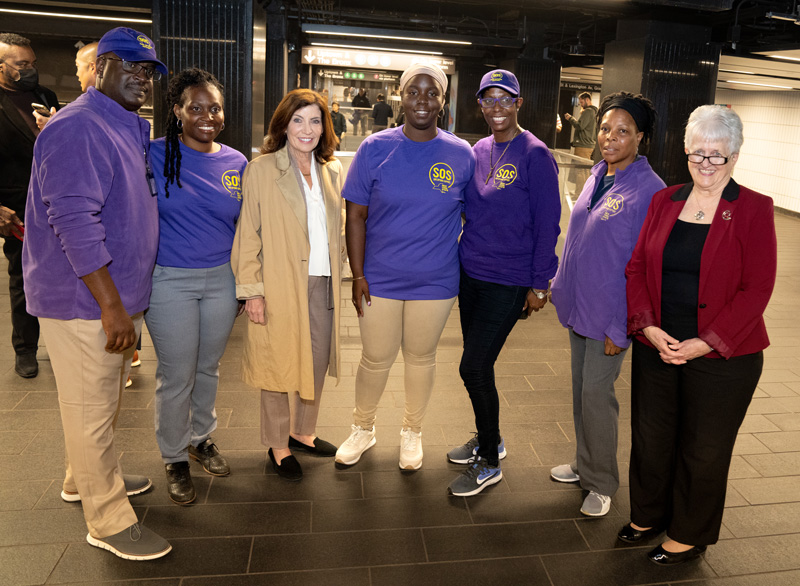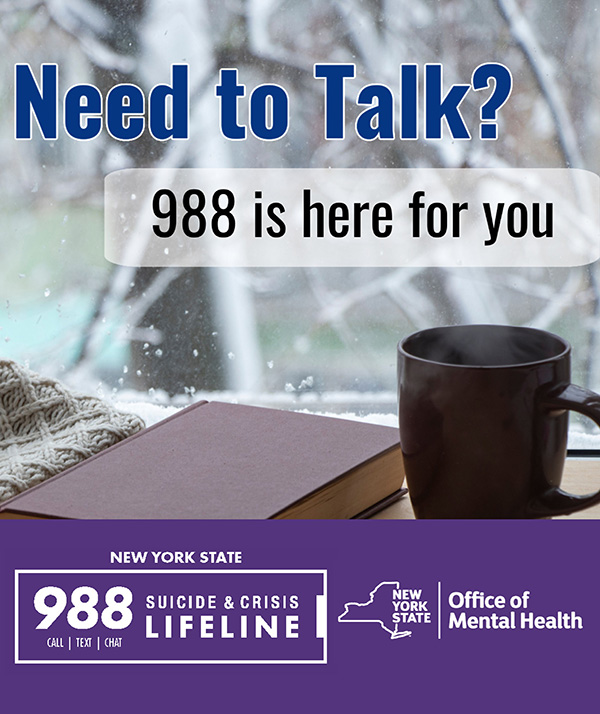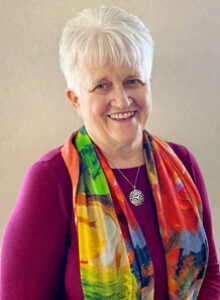Safe and stable housing, together with appropriate employment, are important determinants of mental and physical health. For people who are living with mental illness, housing and employment can play a critical role in their journeys towards recovery.

SOS staff (L to R): Richard Byamugisha, Charisse White, Jemima Babb, Crystal McClellan, Sandrine Clarke
NYS Governor Kathy Hochul (3rd from left), and NYS OMH Commissioner Ann Sullivan (far right)
Governor Hochul has long recognized the importance of housing and employment for individuals living with mental illness. Her $1 billion plan to overhaul and strengthen the state’s mental health care system includes the creation of 3,500 new units of housing, including 1,500 supportive housing units, 900 transitional step-down units, 600 units of apartment treatment housing, and 500 community-residence single room occupancy units.
But even before the Governor initiated this historic investment into mental health services, she was already focused on providing much needed support to people living with mental illness who were experiencing homelessness and sheltering in the NYC subway system.
The Governor directed the NYS Office of Mental Health (OMH) to create Safe Option Support (SOS) teams to conduct outreach, engage, and support unsheltered homeless individuals, connect them with services, and help them secure permanent housing. SOS teams comprise of licensed clinicians, care managers, peer specialists, and registered nurses, and they provide intensive outreach and support, focusing on building a trusting relationship and partnering with clients to connect with services, enter housing, and work together to realize their goals.
To date, SOS teams have had more than 11,500 outreach encounters, enrolled more than 1,200 people into the SOS program, and, most importantly, have helped place 228 formerly homeless clients into supportive housing where they can live successfully in their community.
One such client is a 30-year-old woman who was battling homelessness as well as several mental health challenges, including depression, anxiety, and post-traumatic stress disorder. An SOS team built a rapport and worked with her as she was admitted to a local hospital, actively participated in her discharge planning, and helped ensure a successful transition to community-based services and temporary shelter when she was discharged.
When she told the SOS team she wanted to live independently in her home, the team’s peer specialist worked tirelessly to help her secure placement into permanent housing with support services. Her life changed dramatically, from homelessness and despair to optimism and personal growth.
Another SOS success story concerns a man who had been homeless for ten years after a five-year incarceration for drug possession. He was battling feelings of despair and hopelessness when he encountered an SOS team last August. Over several visits, the team helped him learn more about the available services and assisted him in attaining emergency housing and later, employment.
When he agreed to receive services, SOS team members accompanied him to his appointments, served as his advocates, and helped him attain permanent supportive housing. His life has improved markedly, and he recently notified the SOS team that he found employment.
Finding a job has given him a sense of pride, accomplishment, and greater independence. Studies show that people with even the most serious mental illnesses report a higher quality of life, greater self-esteem, and fewer psychiatric symptoms when they are employed. Conversely, unemployment and underemployment have been linked to increased anxiety, depression, and other negative outcomes.
Unfortunately, unemployment rates for people with mental illnesses are far higher than the general population.
OMH addresses this problem by increasing support and investment in several employment programs that help people develop the skills they need to attain and sustain competitive, integrated employment. A $2.8M increase in the 2022 budget, followed by a historic $12.9M increase in 2023, enabling OMH to not only incentivize employment as a primary outcome for our provider community but to enhance the level of support, training, and technical assistance necessary to achieve those outcomes. Peer Specialists are critical to recovery throughout all OMH services and enable individuals to fulfill their hopes and dreams and find housing and employment.
We have increased funding and support for all employment and rehabilitation programs to implement Individual Placement and Support (IPS) principles and practices. IPS is an evidence-based model of supported employment for people with serious mental illness. IPS-supported employment helps people living with behavioral health conditions work at their chosen jobs.
OMH also leads the New York Employment Services System (NYESS), a unique collaboration with the Department of Labor, the Office of the Chief Disability Officer, the State Education Department, the Commission for the Blind, the Office of Alcoholism and Substance Abuse Services, Office for People with Developmental Disabilities and the Office for the Aging, which helps remove barriers to employment for all individuals with disabilities, including those with mental illness.
NYESS is a comprehensive resource for all subjects related to employment and disability for job seekers and their families, providers of employment services, businesses, and state agencies. NYESS is also a collaborative employment services case management data system and a statewide Ticket-to-Work Administrative Employment Network.
Personalized Recovery Oriented Services (PROS) programs across the state also help people living with mental illness find appropriate employment. PROS incorporates IPS and is a comprehensive model that integrates rehabilitation, treatment, and support services for people with serious mental illness, enabling them to achieve their goals, including finding and keeping housing and employment.
One client of a PROS program said employment “…has helped me get back into society … and has given me friends. My job means a lot to me, it gave me a perspective on life again, especially after living on the sidewalk for 20 years. My employment specialist helped me do all the stuff on the computer; the application process was long. The employment group helped me reach my goal of getting a job – we worked on resumes, we talked about experiences and provided feedback. When it was time for the interview my employment specialist helped me get all dressed up, she gave me encouragement, helped me calm my nerves and told me to “just be myself.”
Another client of a PROS program said her experiences have taught her, “You can accomplish your goals and dreams of who you want to become. Do not allow your mental health to stop you from achieving in life. You can do it. There may be obstacles and challenges; however, you can overcome them because I did, and I still am every day.”
Those words are extremely powerful and important for us to remember when facing challenging times. Her philosophy can be a guiding principle to a fulfilling and successful life in the community.
Each of us has hopes, dreams, and goals that we want to reach in our lives. We all need housing and employment to reach those goals. We all need the opportunity to live to our full potential, including friends, family, and work opportunities. When anyone is facing mental health challenges, they must have available the opportunities and support needed to achieve their goals.
Ann Sullivan, MD, is the Commissioner of the NYS Office of Mental Health.







